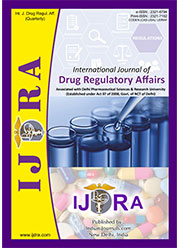Product Patrolling: Learning Recall execution Strategies through Case studies
Abstract
There has been an increasing trend in the number of prescribed and over-the-counter drug recall over the last few years. The recall is usually due to company’s discovery, customer’s complaint or Food and Drug Administration (FDA) observation. The process of recall involves a planned specific course of action, which addresses the depth of recall, need for public warning, and the extent of effectiveness checks for the recall.This abstract explores the critical aspects of pharmaceutical drug product recalls, focusing on their classification, recall levels, and effective recall strategies. The pharmaceutical industry faces challenges in ensuring the safety and efficacy of drug products, necessitating a robust recall framework. We delve into the classification of recalls, ranging from voluntary actions to mandated recalls, emphasizing the importance of prompt and transparent communication. Recall levels, categorized based on the severity of potential health risks, are examined to provide a comprehensive understanding of the regulatory landscape. Furthermore, this abstract highlights innovative recall strategies, encompassing technology-driven traceability, stakeholder collaboration, and crisis communication. By addressing these key elements, this research contributes to enhancing the efficiency and reliability of drug product recall processes, ultimately safeguarding public health and bolstering industry resilience.
Downloads
References
https://cdsco.gov.in/opencms/export/sites/CDSCO_WEB/Pdf-documents/biologicals/4GuidelineRecalRapidAlert.pdf
2. Venkatesh MP, Bigoniya D, Pramod Kumar TM. Pharmaceutical product recall procedures in India, South Africa and China. Int J Pharm Sci Rev Res. 2017 Sep;46(2):98-104.
3. Bhalodiya BL, Vyas AK, Patel AI, Dudhrejiya AV, Patel AB. A Study on Pharmaceutical Drug Recall. Asian Journal of Pharmaceutical Research. 2023;13(2):99-104.
4. FDA. Recalls, Corrections and Removals (Devices) [Internet]. FDA; 2020 Sep 29 [cited 2023 Oct 10]. Available from:
https://www.fda.gov/medical-devices/postmarket-requirements-devices/recalls-corrections-and-removals-devices
5. PharmaNewsIntelligence. Understanding Pharmaceutical Recalls, Key Players, and Their Roles [Internet]. PharmaNewsIntelligence. 2023[cited 2023 Nov 14]. Available from:
https://pharmanewsintel.com/features/understanding-pharmaceutical-recalls-key-players-and-their-roles

This work is licensed under a Creative Commons Attribution-NonCommercial 4.0 International License.
The International Journal of Drug Regulatory affairs require a formal written transfer of copyright from the author(s) for each article published. We therefore ask you to complete and return this form, retaining a copy for your records. Your cooperation is essential and appreciated. Any delay will result in a delay in publication.
I/we have read and agree with the terms and conditions stated Page 2 of this agreement and I/we hereby confirm the transfer of all copyrights in and relating to the above-named manuscript, in all forms and media, now or hereafter known, to the International Journal of Drug Regulatory affairs, effective from the date stated below. I/we acknowledge that the IJDRA is relying on this agreement in publishing the above-named manuscript. However, this agreement will be null and void if the manuscript is not published in the IJDRA.
Download link for COPYRIGHT FORM







